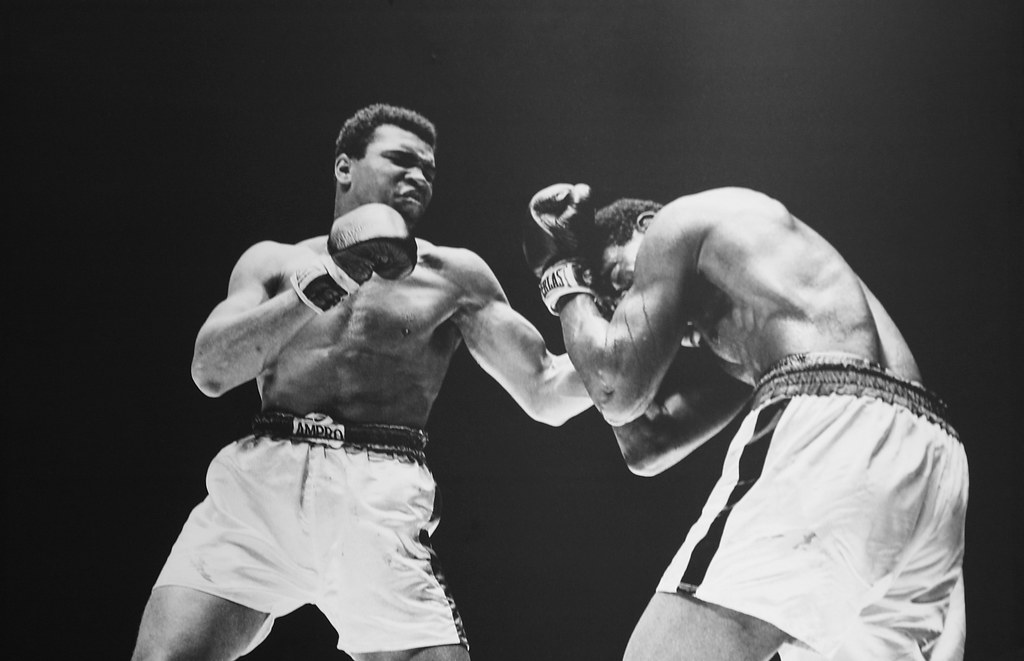
Image courtesy of Cliff 'sFlickr page - Muhammad Ali vs. Ernie Terrell, Houston Astrodome, Houston, TX, 1967: https://www.flickr.com/photos/nostri-imago/4438857719/in/photolist-7LfiKD-96mpL4-CNsvRF-8kfRRq-4yZb4D-KDGms-mF8BJT-e5px29-e5iGgX-5Hjo9i-RHqyE-ofXAdP-ovqpPb-7Knjgg-mARcNa-5CdCAt-5ChUwj-d8aU2-ovNJWq-EwJ5Yv-8zG9iB-oxsoT6-ofZgRH-ovrpSq-oxsphx-oxbp2a-7J7XSx-apBWZZ-ywfeYt-oxNKjd-ovrpou-oxqtXW-ofZhHx-ogmshw-79D3aG-79CUjJ-79z4qt-79z7fF-79CYXw-79z1hg-79z2yK-79z9H8-79zagp-79CXd9-79z1YT-79z5uB-79z3KZ-79D2Sm-79D18j-79CZvq
Creative Commons License: https://creativecommons.org/licenses/by/2.0/
Muhammad Ali, who described himself as "The Greatest" and also came to be known as such generally speaking, has died.
He was 74 years old.
Ali was one of the greatest boxing champions in history, and became the first heavyweight in boxing history to become champion of the world three different times.
He first won the title by pulling off what was then a shocking upset against seemingly unbeatable Sonny Liston in 1964, to become a brash young champion. The young Cassius Clay, as he was known by back then, liked to talk, and as champion, he had the stage to do so. He was amusing, talking about how pretty and great he was. A year later, the rematch between the two was mired in controversy after Liston collapsed and lost by knockout from a phantom punch, although Ali mused that his punch had actually been too fast for the cameras to catch.
However, he would not keep his title for long, being stripped of it after refusing to serve in the Vietnam War. It was one of the first times that he became a vocal critic of American society at large, pointing out the paradoxes of a racist American society that was willing to send blacks to war overseas to fight and die for their country, but where they would return home to face discrimination, inequality, and lack of opportunity. For his stance and his refusal to serve, he not only lost his title, but went to jail.
Still, his stand was a source of inspiration for many, as was his outspoken nature in general. At a time when blacks still did not have much of a voice to reach the larger society, Ali used his prominence to become a spokesman for greater equality for blacks, and for critique of the predominately white American society. He stirred considerably controversy with his links to the Nation of Islam and his friendship with Malcolm X, among others.
Eventually, Ali came back to the boxing ring, and he had a hugely anticipated match against the new heavyweight champion, "Smokin'" Joe Frazier. Ali claimed that Frazier was not the real champion, that this title was illegitimate, and that he would soundly defeat Frazier in the Madison Square Garden showdown. Both fighters entered the ring with unbeaten records, although Frazier convincingly defeated Ali that night, famously pounding him to the canvass late in the fight, which served as an exclamation point.
For many, this signified that Ali was a washed up ex-champion, although Ali had more surprises up his sleeve. He defeated Frazier in a rematch, and eventually got a chance at the title again in 1974, in another highly anticipated prize fight in Zaire, which became the subject of a book by Norman Mailer, as well as a documentary film, "When We Were Kings."
Foreman was the prohibitive favorite, an undefeated champion who had made very short work of some of the most feared boxers of the day, including Frazier and Ken Norton, both of whom had given Ali a hard time in the ring. Ali was much older than Foreman, and most people did not believe that Ali would be able to last against Foreman's legendary punching power. But in that fight, Ali came up with the "rope a dope" strategy, absorbing Foreman's best shots and essentially tiring him out, all while saving his best for last. In a furious flurry in the eighth round, Ali sent Foreman to the canvass for the first time in his career, and Foreman did not beat the count. For the second time in history, Ali was the heavyweight champion once again.
Ali would successfully defend his title for years, including a legendary third rematch against Joe Frazier, which became known as the "Thrilla in Manila." Ali outlasted Frazier, winning the decision, although it took an enormous toll on him. While Frazier went out partying, Ali went to the hospital. Ultimately, Ali would lose his title once more to Leon Spinks in a big upset, although he would also win it back again in a rematch.
Ultimately, Ali would slow down and become increasingly ineffective in the ring, taking a beating against fighters who he might have beated years before, including to Larry Holmes and to Trevor Berbick. It was a part of his legacy, then, that he hung around long after he should have retired, although he hung on long after he should have hung it up.
After his boxing career ended, Ali developed Parkinson's Disease, and this took an increasingly huge toll on him.
Still, Ali is rightly best remembered for his legendary boxing career, which included some of the most famous and legendary fights in boxing history, as well as for his articulate criticisms of the unfairness that he found in American society, and his willingness to pay a huge price to stand up for what he believed to be right.
RIP< Muhammad Ali, 1942 - 2016.
No comments:
Post a Comment